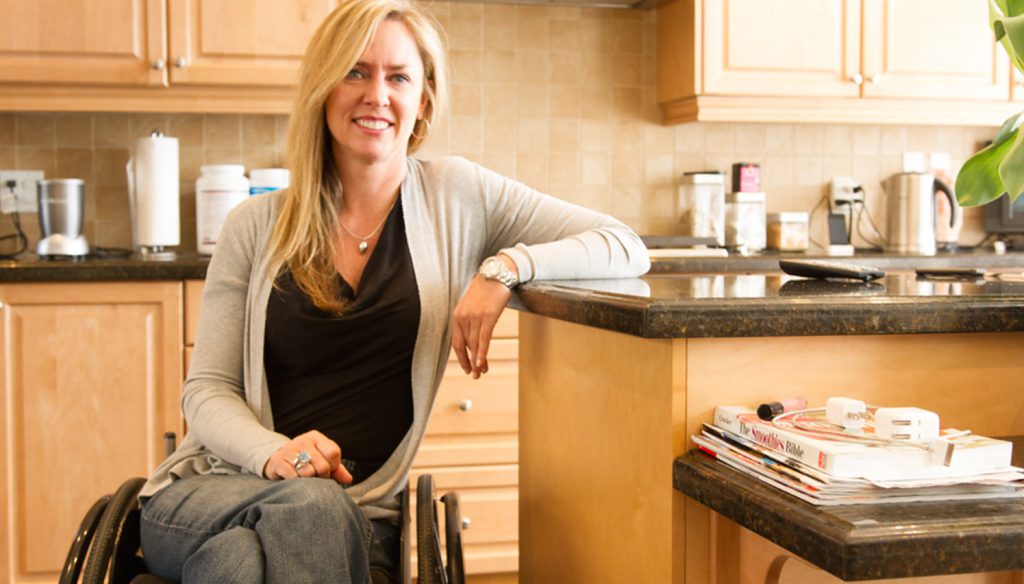
In my previous career as a television host and producer, I had privilege of travelling across Canada creating stories on people with a vast array of disabilities. In these 15 years, I met thousands of innovative, creative and determined individuals with disabilities who were making their dreams a reality. The people I interviewed clearly demonstrated that that having a disability does not stop you from fulfilling your goals and living independently. But what I also observed and learned is, it is the secondary health complications that we face, not our primary disability, that can restrict our lives and limit our potential.
People with disabilities face a myriad of serious and potentially life threatening secondary health issues, such as osteoarthritis, pressure wounds, heart disease, stroke, obesity and type 2 diabetes. My best advice in how to treat these secondary conditions is to do everything in your power to prevent them from developing in the first place.
One of the key ways you can practice preventative health care and attain optimal health and well-being is through nutrition.
Food is a powerful medicine. Unlike traditional allopathic medicine, which fights disease and treats symptoms, nutrition has the ability to address the underlying cause of what’s going on in the body and boost overall health through the intake of correct nutrients. The body is a complex organism that has the ability to heal itself if given the right foods.
Unfortunately, today’s modern diet consists primarily of processed and refined foods, which are stripped of nutrients, low in fibre and are contaminated with potentially health threatening chemicals such as pesticides, hormones, antibiotics, preservatives, artificial colourings, flavoring and sweeteners. Therefore it’s essential to focus on eating whole foods, meaning foods that are as close to their original form as possible. Fresh fruits, vegetables, whole grains and legumes (peas & beans) are nutrient dense. They also help strengthen our immune system, increase our ability to handle stress and pain, and provide us with more energy to carry out our daily activities.
 In addition to eating whole foods to gain these health benefits, it’s important to ensure that you’re getting a rich variety of them in your diet. On average, most people only rotate 12-15 foods in their entire diet. We are creatures of habit, we know what we like and are drawn to the same foods over and over again. Instead, I highly recommend having more fun with your meals, try new foods! This will help ensure that you are giving your body the variety of nutrients it needs to function at its best.
In addition to eating whole foods to gain these health benefits, it’s important to ensure that you’re getting a rich variety of them in your diet. On average, most people only rotate 12-15 foods in their entire diet. We are creatures of habit, we know what we like and are drawn to the same foods over and over again. Instead, I highly recommend having more fun with your meals, try new foods! This will help ensure that you are giving your body the variety of nutrients it needs to function at its best.
Many people I work with assume that eating well means spending more, but there are numerous ways to get healthy, whole foods into your diet and stay within your budget. Many whole foods cost less than things like chips, chocolate, meat and pop. In fact, it’s healthier and cheaper to build your main meal from grains and legumes instead of meat. Grains and legumes can be bought in bulk inexpensively and there are endless ways to enjoy them.
I always tell my clients not to put pressure on themselves to try and change their entire diet all at once. This approach may result in feeling overwhelmed, frustrated and could lead to self-defeat. The foods we eat and how we prepare them are habits that have developed over years, so it’s not realistic to expect that you can transform them overnight. Furthermore, our bodies need time to adjust to new foods, higher nutrient levels and increased fibre intake. So start with one meal at a time. For instance, work on changing your breakfast foods over the course of a few weeks. Once you’ve successfully modified this routine, then move on and tackle your lunch or snack foods and so on.
I strongly advise you to take a preventative approach to your health by making wise nutritional choices. Doing so will not only support your overall health, but help protect you from developing debilitating secondary health conditions, and more importantly, enable you to continue pursing and accomplishing all the incredible things that are most important to you.
Still hungry for more information? Visit Cortree Disability Education Centre for an entire course covering accessibility in the kitchen, as well as a full curriculum of courses pertaining to living with a disability.
Joanne Smith, BA, BRT, CNP is a Toronto-based SCIO community member, Certified Nutritional Practitioner, owner of Fruitful Elements and frequent contributor to SCIO communications.

